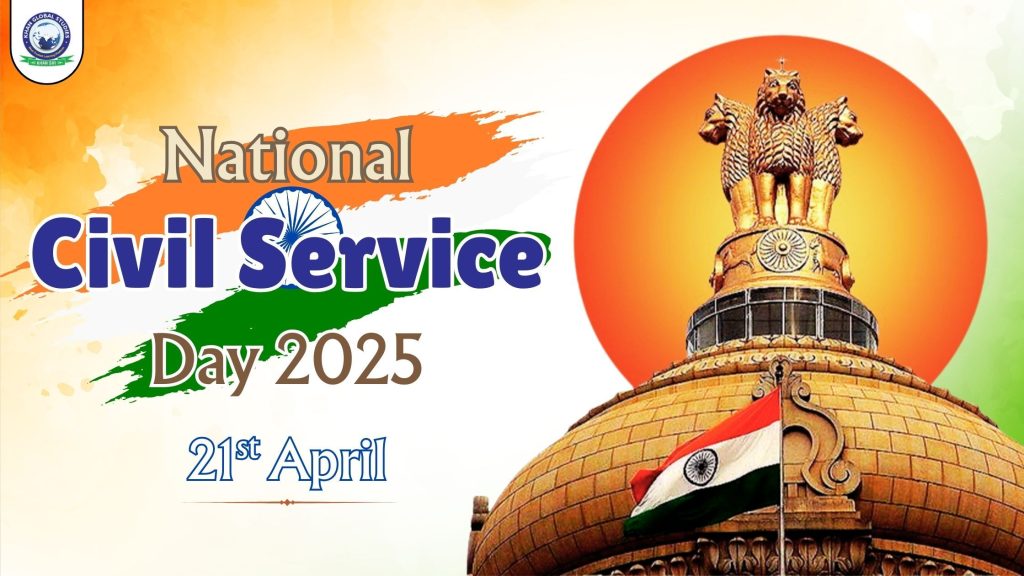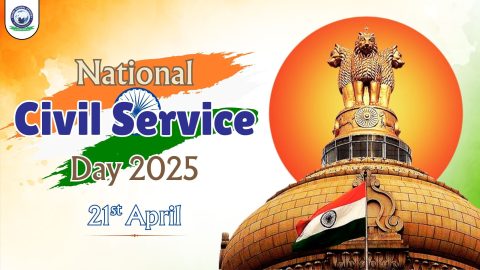Civil servants play a pivotal role in strengthening a nation’s governance, social justice, and legal systems. They are the architects of a better, more efficient country. To honor their dedication, India celebrates National Civil Services Day every year on April 21. This day is dedicated to recognizing the contributions of civil services—considered the backbone of India’s administrative framework—and to inspire them in their continuous service to the nation.
India’s civil services include the Indian Administrative Service (IAS), Indian Police Service (IPS), Indian Foreign Service (IFS), and officers of Group ‘A’ and ‘B’ under the Central Government.
On this day, the Government of India honors those civil servants who have made outstanding contributions in the field of public administration. The Prime Minister of India personally presents awards to officers who perform their duties with dedication, honesty, and integrity.
Every year, millions of aspirants appear for the UPSC Civil Services Examination, but only a few hundred succeed. This day also serves as a source of motivation for those who aspire to serve the nation through civil services.
History of National Civil Services Day
On April 21, 1947, Sardar Vallabhbhai Patel, India’s first Home Minister, addressed the probationary officers of the Indian Administrative Service at Metcalfe House in Delhi. In his iconic speech, he referred to civil servants as the “Steel Frame of India” and urged them to remain committed to serving the nation.
To commemorate this historic speech, the Government of India started celebrating National Civil Services Day from 2006. The first official event was held at Vigyan Bhawan, New Delhi, setting the tradition of honoring exemplary civil servants with awards presented by the Prime Minister.
Historical Evolution of Civil Services in India
- Maurya Period: The roots of ancient Indian governance can be traced to Chanakya’s Arthashastra, where he described the key pillars of administration—King (Swami), Officials (Amatya), Territory (Janapada), Forts, Treasury, Law, and Allies. Civil servants were appointed based on merit due to the vastness of the Mauryan Empire.
- Mughal Era: The Mansabdari system, introduced by Akbar in 1571, was a structured military and administrative framework that highlighted the role of civil officers.
- British Rule:
- The term “Civil Services” emerged during the British East India Company’s rule. Warren Hastings laid its foundation, and Charles Cornwallis restructured it, earning the title “Father of Indian Civil Services.”
- In 1835, Macaulay’s Report introduced a merit-based system. Competitive exams began in London in 1855, and Satyendranath Tagore became the first Indian to clear the exam in 1864.
- Post-Independence: After India’s independence, the Union Public Service Commission (UPSC) was established. Since then, civil services have played a crucial role in economic development, planning, and promoting social equality, contributing to the nation’s unity and progress.
Objectives of the Celebration
National Civil Services Day is organized by the Department of Administrative Reforms and Public Grievances (DARPG) under the Ministry of Personnel, Public Grievances and Pensions.
Its key objectives include:
- Encouraging civil servants to re-dedicate themselves to public service.
- Promoting excellence in performance and responsible governance.
- Providing the government an opportunity to assess departmental performance.
- Honoring top-performing civil servants through the Prime Minister’s Awards.
Current Challenges in Indian Civil Services
Despite rising expectations from citizens, public service delivery often falls short. Major issues include:
- Resistance to change and maintaining the status quo.
- Lack of professionalism and capacity-building initiatives.
- Systems that inadvertently promote corruption.
- Outdated rules and procedures that hinder efficiency.
- Political interference and lack of transparency.
- Inadequate accountability and arbitrary transfer policies.
The Need for Reforms
To modernize and enhance civil services, several reforms are necessary:
- Structural Reforms: Reduce the number of ministries and focus on administrative consolidation and prioritization.
- Recruitment Overhaul: While the UPSC exam is rigorous, it often overlooks technical knowledge, human rights awareness, and managerial skills. Inclusion of domain experts is crucial.
- Capacity Building: Regular training must incorporate emerging technologies and global trends. Officers should be empowered with greater responsibilities and fewer bureaucratic hurdles.
- Enhanced Accountability: Strengthen internal reporting systems, link performance with rewards, and enforce tools like RTI and citizen charters more strictly.
Significance of National Civil Services Day 2025
This day is a tribute to the hard work, honesty, and dedication of civil servants who keep the machinery of governance running smoothly. On this day:
- Officers from central and state governments are honored by the Prime Minister.
- Innovative public service initiatives and district-level projects are awarded.
- Seminars and discussions are held across the country on the evolving role of civil services.
- Aspirants are inspired to become honest, accountable, and service-oriented civil servants.
Values and Vision Expected from Civil Servants
“You must consider public service a noble privilege, adhering to its contracts throughout your life while maintaining its integrity, dignity, and a corruption-free image.”
— Sardar Vallabhbhai Patel
A true civil servant is not only disciplined but also upholds values like team spirit (esprit de corps), public accountability, transparency, and policy commitment. Their role extends beyond implementation—they help shape governance and influence the pace of national development.
Civil Services in National and Global Context
In a diverse and democratic country like India, civil servants act as the primary channel between the government and its citizens. While many countries struggle with transparency, Indian civil servants continue to work tirelessly under challenging conditions to improve the lives of citizens across the nation.
Conclusion
In a country as vast and diverse as India, a strong and efficient civil service system is the foundation for development, inclusivity, and just governance. Though implementing reforms is not easy, political will, public participation, cooperation from officers, and technological tools can drive transformative change.
National Civil Services Day 2025 not only reminds us of our administrative values but also highlights the urgent need to modernize civil services for the nation’s continued progress.





